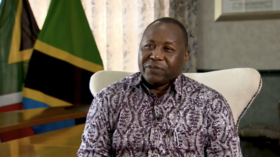India views BRICS expansion with ‘open mind’ – top diplomat
Prime Minister Modi will attend the Johannesburg summit, with the priorities of the Global South likely to dominate the agenda
Indian Prime Minister Narendra Modi is set to arrive in South Africa for the 15th BRICS Summit, with economic cooperation between countries of the Global South, food security, and the bloc’s expansion at the top of the agenda.
India views the BRICS grouping as an important expression of global multipolarity, Foreign Secretary Vinay Mohan Kwatra told media in New Delhi, as he outlined the details of New Delhi’s participation in the Johannesburg gathering, taking place on August 22-24.
South Africa holds the rotating presidency of the bloc, which also includes Brazil, Russia, India and China, and will be hosting the first in-person summit for the alliance since 2019 – after the past three were held in a virtual format due to the Covid-19 pandemic.
Kwatra also reaffirmed India’s stance on BRICS expansion, saying New Delhi is approaching it with “positive intent and open mind.” However, he refused to provide any insights on discussions between the countries’ sherpas on the criteria for taking on new members. Over 20 nations have formally requested to join the grouping, and representatives of around 40 countries are likely to attend the summit, the broadest-ever participation.
Some themes of the BRICS Summit, including the priorities of the Global South, will overlap with those of the G20 leaders’ gathering to be hosted by New Delhi next month, Kwatra affirmed, noting that the G20 will see the largest participation of African countries in its history. The Indian prime minister will also participate in “BRICS – Africa outreach and BRICS plus dialogue,” organized by host nation South Africa on the sidelines of this week’s event, underscoring the importance of the African continent to New Delhi’s economic diplomacy.
Answering a question about the possibility of the BRICS countries introducing a common currency, something that Russia and Brazil have been suggesting, the Indian diplomat noted that such discussions require several prerequisites, and so far the BRICS countries have only focused on trade in national currencies. “The substantive part of trade and economic exchange and discussion [between the BRICS member countries] have so far, in a major way, focused on how to increase trade in respective national currencies, which is diff from a common currency concept,” he asserted.
As for India’s trade with other nations using the Indian currency, Kwatra said New Delhi would like to expand rupee trade with “as many countries as possible.” Citing the recent commencement of rupee-dirham trade with the United Arab Emirates, he said guidelines for similar initiatives will be announced soon.
At the summit, Prime Minister Modi is likely to make a pitch for joint counterterrorism efforts and the need for member states to respect each other’s security interests. Talks will center on the grouping’s significance in the post-pandemic world, where India’s emergence in the digital transformation may be discussed along with China’s bid to portray BRICS as a rival to G7.
Speculation is rife that Modi and Chinese President Xi Jinping could hold talks on the sidelines of the summit, similar to informal discussions during the G20 leaders’ meeting in Bali, Indonesia, last year. Bilateral ties between the two nuclear-powered neighbors remain frosty over border disputes.
After the BRICS Summit, Modi will travel to Greece – the first visit by an Indian prime minister in 40 years – seeking to strengthen bilateral defense and maritime security and also boost the “Make in India” program.
You can share this story on social media:








Comments are closed.